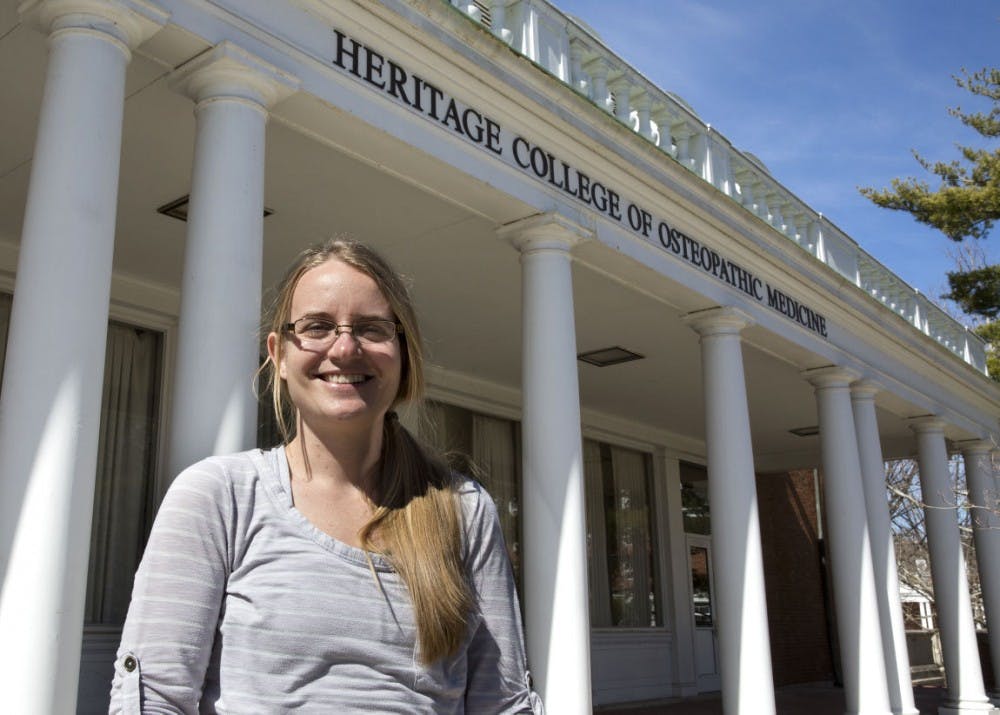A new LGBT-friendly lecture was implemented as part of an OU course this year in an effort to assure medical students practice sensitivity in dealing with LGBT patients.
Ohio University Heritage College of Osteopathic Medicine students are brought into a room with an LGBTQ-identified individual and told to ask all of the wrong questions.
However, this is all so that they don’t make the same mistakes when they are professionals in the medical field.
Eleven years ago, only one two-hour LGBTQ Health and Wellness Lab was taught at OUHCOM, Dr. Jane Balbo of Campus Care said in an email.
Now, OUHCOM is taking steps to help doctors better understand and treat LGBTQ patients.
The most recent addition is a one-hour lecture called “Providing Primary Care To Transgender Patients,” which was implemented this year. The lecture was incorporated into the obstetrics and gynecology course, which is taken by students in the Clinical Presentation Continuum, who represent about three-fourths of OUHCOM’s students.
Dr. Katy Kropf at University Medical Associates and Balbo created this after they were invited to give a lecture on the topic at the American Medical Student Association’s Annual Conference.
“In medicine in general, the importance of all physicians providing quality care to transgender patients is being recognized more and more each day,” Balbo said in an email. “We recognized this as a need that could be filled by our curriculum.”
{{tncms-asset app="editorial" id="d62daade-ce8b-11e4-822f-fb063a8565ca"}}
Delfin Bautista, LGBT Center director, and Susan Young, who leads the Spectrum support group for gender non-conforming people, helped faculty develop a one-day, two-hour class within the clinical skills course about LGBT Health and Wellness lab, Balbo said in an email. The material that was once taught primarily in 2011 is now the preparatory work for the lab.
In the class, students interview LGBT individuals about their life experiences in health care, Balbo said in an email.
“I’ve never really had too much exposure with trans people, and that health and wellness lab was really eye-opening to me in terms of what the trans community goes through,” said Alison Brittain, an OUHCOM student in her second year. “You want to ask, ‘Are you in a relationship?’ not ‘Do you have a boyfriend or girlfriend?’ It gives them comfort that even if they are transgender, that that’s OK with me.”
During this training, medical students are taught how to speak respectfully regarding gender and sexual orientations. Students are taught to ask patients for a preferred name, pronouns and gender identity.
Brittain said she has witnessed hostile attitudes toward the LGBT community from doctors at one of the local hospitals she had shadowed, overhearing someone voicing disagreement with gay marriage.
“The idea of being a doctor is being able to medically help people in the best way that we possibly can. A lot of that has to do with making the patient feel that they can talk to you,” Brittain said.
Brittain said branching out in her knowledge and interactions with LGBTQ identities has helped in her learning process.
“I know a trans woman who is transitioning now from male biologically and talking to her has been a really big step forward for me in terms of understanding and becoming fluid in terms of pronouns,” Brittain said.
Bautista said that while steps have been taken in the right direction as far as training on LGBTQ issues in the medical sphere, there is still a long way to go.
“Negative experiences of coming out within a health care setting may completely stop a person from going to the doctor ever again just because they had a very negative experience,” Bautista said. “As much as we may not want to, we all have to go to the doctor eventually, and hopefully we can make it as comfortable as we can.”
The two classes are not the only LGBT training that OUHCOM students are taught. Some material is taught through specific instances of “cases,” or patients who present with specific medical concerns, many of which include LGBT patients.
Additionally, two lectures are given in the first year on “taking a sexual history” during which issues of sexual orientation and gender identity are addressed, Balbo said in an email.
“They’re students, and it’s an opportunity for them to learn and make mistakes in a safe way so that hopefully when they are in real practice they know better,” Bautista said. “We hopefully want to really try to infuse what it means to provide good health care to all people throughout the entire curriculum.”
@rachel_hartwick






